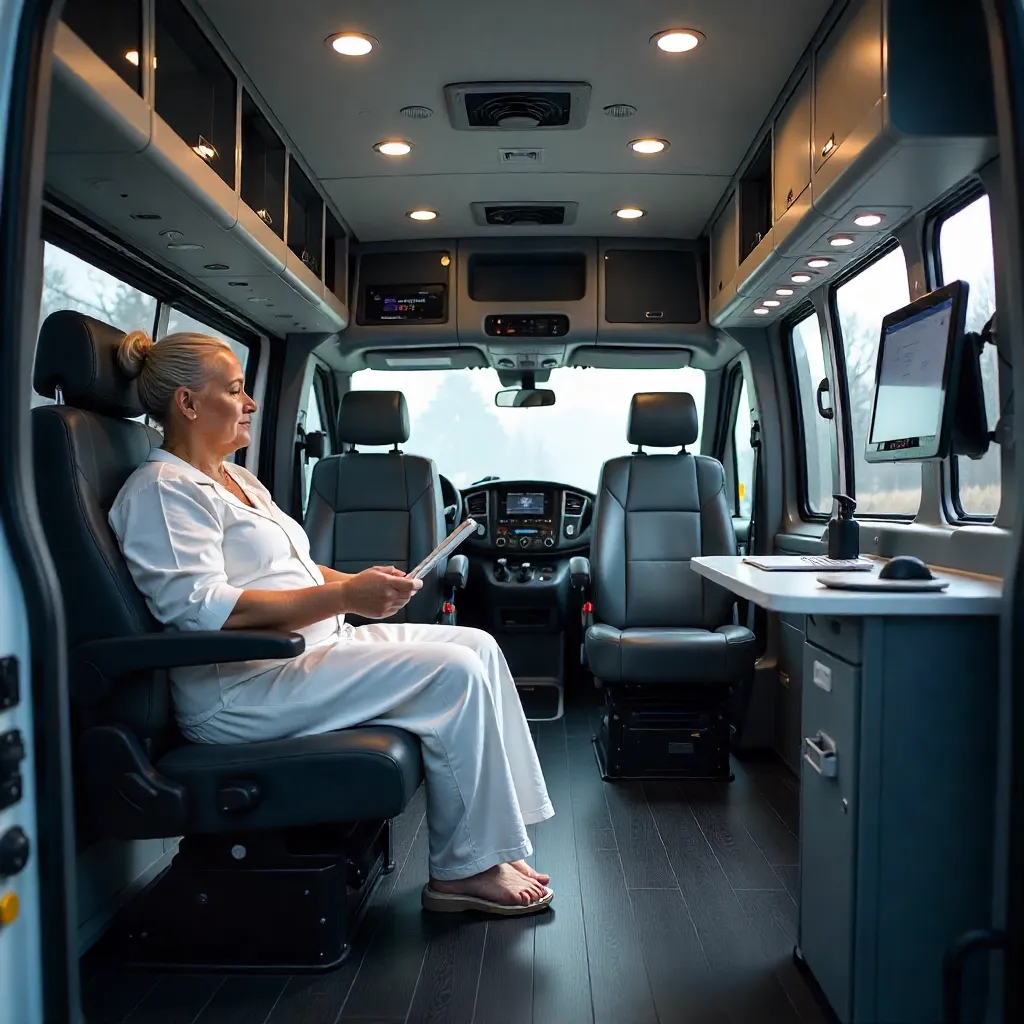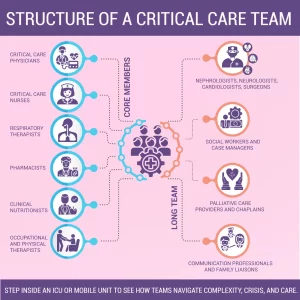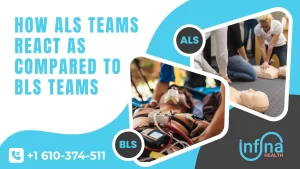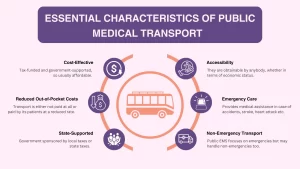Tips to Choose the Right Medical Transport for Neurological Conditions
The decision to select the correct medical transport is among the most crucial ones of all families and caregivers confronted with transportation issues that neurological patients must deal with on a daily basis. Stroke, Parkinson, Alzheimer, epilepsy, ALS, and multiple sclerosis are not only medical diagnoses but create barriers that directly affect mobility, independence, and access to healthcare.
Therefore, to such patients, transportation is not simply about moving between two locations, but about the ability to have safety in accessing health services. As it minimizes the chances of health complications and being able to preserve dignity and comfort in the process of transportation.

Interior of a medical van with safe seating and modern equipment for monitoring
Knowledge on Neurological Conditions Transportation Barriers
Among the most urgent concerns of patients and caregivers is the neurological conditions transportation barrier. These barriers do not simply concern the ability to move between locations, but they directly influence continuity of care, patient safety and general quality of life. Therefore, a lot of neurological conditions are associated with complex conditions that complicate traveling, be it during routine visits, treatment, or emergency visits.
1. Physical Limitations and Mobility Problems
One of the most prevalent patient mobility needs is mobility impairments. Meanwhile, the transportation problems are common in conditions like Parkinson disease and mobility problems in multiple sclerosis. Generally, the symptoms for these involve tremors, paralysis, spasticity or extreme rigidity of the muscle.
However, these conditions make the patient dependent as they cannot use trains or cars because it would be unsafe. Ultimately, these people are at risk of falls, injuries or missing healthcare services without the assistance of reliable patient transportation services.
2. The Cognitive Disorder and Disorientation
There is an additional transportation barrier to neurological conditions that is cognitive. Memory loss, confusion, and disorientation are common in patients with Alzheimer disease or dementia. This renders using buses, trains or even ride-sharing services to be daunting and unsafe. In this case, caregiver support transportation services are necessary, which can alleviate family stress, and patients can still access healthcare services safely.
3. Balance, Coordination and Fall Risk
Balance, dizziness or coordination difficulties are common in stroke survivors and patients who have sustained traumatic brain injuries. Even short journeys would become unsafe in the absence of available transport services. There is a high risk of falling when using vehicles, stairs, or unstable surfaces. These dangers are minimized by specialized Non-Emergency Medical Transportation (NEMT) using trained drivers and mobility assistance.
4. Dizziness and Fatigue on Travel
Fatigue is an issue that patients undergo on a daily basis especially when they have chronic neurological conditions such as multiple sclerosis. Prolonged journeys may cause patients to be tired and deteriorated, making them less able to engage actively in treatment or rehabilitation programmes. Meanwhile, this can be minimized through door-to-door transport services that are comfort- and efficiency-focused to enhance uniformity in care delivery.
5. Driving and Epilepsy
Epilepsy poses special transportation problems to neurological patients. People with seizure disorders are frequently restricted to drive their personal vehicles. In the absence of vehicles that are wheelchair friendly or dedicated medical transportation services, patients risk missing essential care. Indicatively, missing diagnostic, mental health, or therapy transportation may have ripple effects on health.
6. Dangers of Unsafe Transport
In rare cases, public transport systems are not structured to take a patient with a neurological condition. The problem is exacerbated by inaccessible wheelchairs, inadequate chairs, low safety standards, and unqualified personnel. Additionally, the unsafe public choices can cause missed medical appointments transportation issues, late treatments, and worsen the conditions. Especially, it is with patients who are already compromised by mobility impairment, fatigue or travel restrictions because of seizures.
Transportation should not be the barrier between your loved one and their care.
Learn about how our Non-Emergency Medical Transportation (NEMT) service is comfortable, safe, and timely to receive healthcare.
Schedule a Ride with Us Today!
Non-Emergency Medical Transportation (NEMT): A Lifeline to Neurological Patients
Non-Emergency Medical Transportation (NEMT) is an urgent service developed to address transportation barriers. It is related to neurological conditions to provide patients with efficient, safe, and specialized transportation. In contrast to taxis, rideshares, or even public buses, NEMT offers the support of neurological patients mobility that is grounded in the specificities of living with Parkinson, Alzheimer, multiple sclerosis, epilepsy, ALS, and other diseases.
Major Characteristics of NEMT Services
1. Stretchers and wheelchair-accessible vehicles.
Notably, many neurological patients are severely impaired in terms of mobility (paralysis, tremors, or spasticity). NEMT has vehicles that have wheelchair lifts, ramps, and stretcher equipment, which enable patients to move without difficulties and security concerns. These vehicles make it accessible to patients who would otherwise not be a part of conventional transportation.
2. Post-discharge transportation services with low risk of falls.
Stroke survivors, patients with Parkinsonism, and balance problems are at the greatest risk of falls during transit. Meanwhile, the door-to-door transport services reduce this risk by helping patients travel to hospitals and back home. Ultimately, it relieves anxiety among patients and caregivers.
3. Medically trained medical transport drivers who understand the neurological conditions.
The NEMT staff is trained specifically on the management of neurological patient mobility assistance, unlike typical drivers. They know how to deal with such issues as tremors, loss of memory, seizures or muscle rigidity and react to them in a calm and effective manner to provide safe and dignified experience along the way.
4. Medically trained medical transport drivers who understand the neurological conditions.
The NEMT staff is trained specifically on the management of neurological patient mobility assistance, unlike typical drivers. They are aware of the difficulties such as tremors, memory loss, seizures, or muscle rigidity and can react effectively and calmly, taking care of both safety and dignity during the trip.
5. Transport comfort and safety with secure seating and supportive equipment.
Patients can be comfortable during travel with properly secured wheelchairs, reclining seats, grab bars, and cushioned interiors. As these features can eliminate complications in patients with fatigue, dizziness, or spasticity and reduce the stress of medical transport.
6. Drive to various appointments
Physician visits – Checkups, regular care and visiting specialists.
- Rehabilitation and therapy transport: Consistent use of physiotherapy, occupational therapy, or speech therapy sessions, essential as part of recovery.
- Mental health appointment transportation: Assistance to patients to facilitate counselling sessions, psychiatric or therapy sessions and cannot drive themselves.
- Diagnostic and lab transport services: Consistent rides to imaging, blood or other medical examinations, to stay consistent in treatment.
By mitigating transportation barriers to neurological conditions, NEMT not only resolves transportation issues related to missed medical appointments but also facilitates continuity of care via transportation, resulting in better health outcomes.
Careful patient Transportation to Parkinson, MS, Alzheimer and more
Every neurological condition presents special problems. These needs are addressed by reliable patient transportation services which provides the patient with safety, dignity, and comfort and minimizes the stress of caregivers.
1. Parkinson’s Disease Transportation
- Additional unboarding and boarding support to counter the tremors and muscle stiffness.
- Fall prevention items like handrails, grab bars, no fall flooring.
- Adaptable time schedules that consider periods of freezing to allow patients ample time to safely move without experiencing pressure.
2. Multiple Sclerosis Mobility Problems
- Cushioned or reclining seats to address chronic fatigue and weakness.
- Climate controlled conditions that assist in alleviating MS symptom flare-ups caused by heat or cold.
- The alternative of scheduled rest breaks on longer trips eliminates fatigue and discomfort.
3. Alzheimer Disease Memory Problems
- NEMT personnel educated in dementia-friendly care, assists in calming agitation and alleviating confusion.
- Qualitative, systematic transport environments that reduce sensory overload and stress.
- Safe seating and monitoring to avoid straying or abrupt unsafe movement in transit.
4. Stroke Rehabilitation Travel Barriers
- Experienced personnel that can help patients with partial paralysis, speech disorders, or coordination problems.
- Monitoring equipment uses (blood pressure checks on longer journeys).
- Use of safe transfers in and out of vehicles to minimize the risk of falls and additional injuries.
5. ALS Patient Transportation Requirement
- Specific ambulances or vehicles with tilt tables that are easily adjusted.
- Medical equipment such as ventilators, oxygen tanks and IV pumps.
- Constant monitoring by qualified healthcare personnel to address emergency requirements in transit.
6. Travel Limitations, Seizures, and Epilepsy
- Drivers and attendants learn to administer first aid to seizures.
- Cars with padded seats and safety belts to avoid injury during crashes.
- Limits on the use of unsupervised travel where patients under all times receive good supervision and support
The Benefit of Custom Transportation
Personalized care makes medical transportation of neurological patients safe and as supportive as possible. Be it alleviating stress on caregivers, enhancing patient autonomy, or supporting continuity of care, the availability of transportation services closes the gap between home and healthcare. It is not merely a travel service, but a service dedicated to dignity, better health outcomes, and families throughout the process.
Medical Transportation Caregiver and Family Support
Family demands of a loved one with a neurological issue can be daunting. Besides emotional and financial strain, the weight of transportation is a day-to-day problem. Whether it is the process of booking doctor appointments or handling therapy sessions, a caregiver can be at a loss of time. Professional caregiver support transportation services come in at this point to make a big difference.
The Benefit of Caregiver Support Transportation Services
1. Lessening caregiver burnout and exhaustion.
Commuting, assisting patients, or using unsafe transport may be tiresome. This pressure can be alleviated through reliable transport services which would provide a professional approach towards mobility and cognitive issues.
2. Reliable transportation of aged patients
The elderly patient having Alzheimer, Parkinson, or dementia may need special attention when traveling. The professional services provide secure access to medical services and minimize the risks of wandering, falls, or agitation.
3. Professional transport vs. family burden.
The families might lack the training or equipment to transport their loved ones with neurological disorders safely. Meanwhile, the quality patient transport services offer healthcare supervision, readily available vehicles, and skilled personnel-safety and eliminating the family burden of logistics.
4. Providing family rest with screened drivers and healthcare supervision.
By understanding that there are trained professionals watching over the quest, the families can devote their time to what is important. These include the emotional support and quality time with their loved one rather than worry about the transportation logistics.
By eliminating these stressors, families will help the emotional health of their loved one more effectively, building strong connections as medical professionals work on the issue of travel.
Reliable Transport to Improve Health Results
The contribution of the credible services of patient transportation extends much farther than convenience. It has direct influence on health outcomes and capability of patients to lead quality lives despite nerve diseases.
Key Benefits Include:
1. Minimizing missed doctor visits.
Gaps in treatment can be created by missed doctor visits, visits to therapists or labs. This problem is solved by the availability of transport services that will guarantee steady attendance.
2. Enhancing neurological patient health outcomes.
Frequent treatment and follow-up care aids in managing disease progression. Ultimately, it results in an improved quality of life and better outcomes in the long term.
3. Encouraging continuity of care by transport.
Care works best when it is regular. Therefore, NEMT enables smooth healthcare provision, whether it is a routine doctor visit or a rehabilitation.
4. Assistance in the management of the disease progression.
Parkinson, MS and Alzheimer conditions are aggravated by delay in medical care. Therefore, a dependable transportation assists patients to follow treatment plans, which slow down the progression and minimize complications.
5. Transporting to hospitals with efficiency.
Late or omitted treatment frequently causes crises. Non-Emergency Medical Transportation (NEMT) helps to minimize the number of unnecessary visits to hospitals and expensive stays.
Above all, specialized transport services ensure autonomy of neurological patients because it provides patients with a means of safe and dignified travel. It does not only enhance physical health, but also confidence, independence and general quality of life.
Selecting an Appropriate Medical Transport Service
Not everybody is an equal transportation provider. The selection of the appropriate service will make patients get the required level of support. The following are some of the factors to be considered by families:
- Medical support required on board plane: Some of the patients may only need to be given mere mobility support, and some may require constant supervision or complicated medical machines.
- Wheelchair accessible vehicles: To the patients with mobility impairments, lifts, ramps, and safe seating of wheelchairs are necessary.
- Staff trained in neurological patient mobility: The staff must be experienced in helping patients with tremor, paralysis, cognitive difficulties, or seizure risks.
- Safety and timely transportation capability: Starting with doctor appointments, rehabilitation transportation, diagnostic and laboratory transportation services, dependability is paramount in the continued care.
- Pay attention to patient comfort and safety during transportation: Correct seating, air conditioning, and safe transfers make the trips safe, stress-free and comfortable.
With a close consideration of these factors, families will identify the type of transport that matches the medical, emotional, and safety requirements of their loved ones.
Final Thoughts
Neurological condition is a long term and specific challenge to live with. Nevertheless, the availability of appropriate transportation services not only gives patients a ride but safe access to healthcare services, independence and dignity. It results in relief of logistical stress on families and enhanced health outcomes and a better quality of life among patients.
Does your loved one need specialized medical transportation due to a neurological condition?
Our services are based on ensuring reliability of patient transportation which is aimed to satisfy the needs of patients with the Parkinson, MS, Alzheimer, epilepsy, ALS and stroke among others.
Call Us today to have a secure and caring Transport Service!






